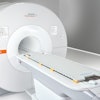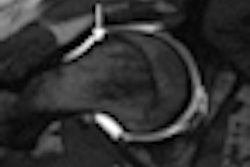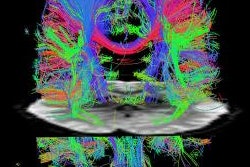Do pediatricians have the clinical acumen to know when a knee MRI should be ordered for a child with knee pain? With an increasing percentage of knee MRI exams being ordered by pediatricians, radiologists at Vanderbilt University School of Medicine in Nashville, TN, investigated and reported their findings at RSNA 2010.
To the surprise of the researchers, pediatricians held their own when compared to orthopedic surgeons, according to J. Herman Kan, MD, assistant professor of radiology and radiological sciences. A study of four years of data evaluating the diagnoses of MRI exams ordered to rule out internal derangement in children with knee pain revealed that the proportion of patients with abnormal findings was comparable for both groups.
The research team, led by Laura Scurria Miller, MD, a third-year radiology resident, hypothesized that the incidence of abnormal knee MRI exams would be higher for orthopedic surgeons than for pediatricians because of the preselected patient population and the specialized training of the orthopedic surgeons. They wanted to determine if a subspecialty referral might represent more cost-justifiable utilization of this expensive diagnostic procedure.
The retrospective study identified all knee MRI exams performed over a four-year period (January 2005 through December 2009) at the Monroe Carell Jr. Children's Hospital at Vanderbilt to rule out internal derangement. A total of 654 exams were identified, of which 60 exams were excluded. The exams excluded from the study represented patients with known abnormalities, those who had prior orthopedic surgery, or those who were cancer patients.
Eighty-four percent, or 501 patients, were referred by orthopedic specialists; pediatricians referred 93 patients. Almost 10% more boys (56%) were referred by orthopedic specialists, compared to 47% by pediatricians. The mean age for both groups was 14 years, with a range of 1 to 18 years.
The radiology reports of the exams were reviewed and categorized as normal or abnormal. Abnormal exams were subdivided into 11 categories. Findings associated with internal derangement were subdivided into four additional subcategories. Clinically significant abnormalities included internal derangement, infectious and noninfectious inflammation, and neoplasm.
Although a larger percentage of children referred by orthopedic specialists had diagnosable knee problems, the difference in the percentages of both normal and abnormal knee MRI exams was not statistically significant, Kan reported. The area of greatest difference was in patients identified with cartilage injury.
Orthopedic surgeon vs. pediatrician referrals
|
Because health insurance policies are requiring that pediatricians serve as gatekeepers for both subspecialty referral and the ordering of advanced imaging procedures, Miller told AuntMinnie.com, it was reassuring to learn that pediatricians had a level of clinical acumen comparable to orthopedic surgeons with respect to ordering MRI exams.
By Cynthia E. Keen
AuntMinnie.com staff writer
January 7, 2011
Copyright © 2011 AuntMinnie.com




















